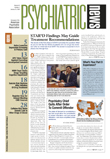I was glad to see the article in the December 16, 2005, issue on the lawsuit against the Department of Health and Human Services (HHS) regarding issues involved in transitioning individuals who are eligible for both Medicaid and Medicare from receiving their drug coverage under Medicaid to the new Medicare Part D program.
I am writing this letter on New Year's eve, with the program starting tomorrow. As far as I can tell, the promise by the Centers for Medicare and Medicaid Services (CMS) to make transition plans and exceptions and appeals processes clear to plan participants has not been kept. In fact, hours of waiting on hold and repeated searches of remote corners of Web sites have left me with a list of numbers and addresses to contact for the plans in my state but only a few details on how clinicians are supposed to communicate with the plans. One plan states on its Web site that it will not provide evidence of coverage material until February; the same plan was able to give me the tip that if I pretended to be from South Dakota, I could get the prior-authorization forms now. (It worked.)
Moreover, the managed care aspect of Medicare Part D has been underplayed by most parties, certainly by CMS. During the last two weeks, the formularies in Maine have changed regarding management techniques affecting many of the protected psychiatric medications, and more changes are expected to come as the program starts. While price and inclusion of particular drugs on formularies are fairly easy to track and compare on the Medicare Web site, it is not easy to compare plans' prior-authorization and step-therapy requirements for new prescriptions without creating a spreadsheet so that the plans can be compared side by side for each drug and each class.
The New York Office of Mental Health has posted a spreadsheet that looks at both psychiatric and general medical drugs in this way at<www.omh.state.ny.us/omhweb/MedicareD/index.htm>, and the Maine Association of Psychiatric Physicians posted a similar spreadsheet focusing initially on protected psychiatric medications at<www.mainepsych.org/partd.htm>.
CMS has not been able to get plans to maintain their Web sites as it has asked them to do regarding transition and appeals information. Accessory points of vigilance and information will be required to hold HHS and the plans to their word and to confront problems in a timely fashion as they become apparent. I am pleased to see that APA has launched a comment service for members, as reported in the same issue:
[email protected] and (866) 882-6227. NAMI and the Medicare Rights Center are going to try to document problems as well.
